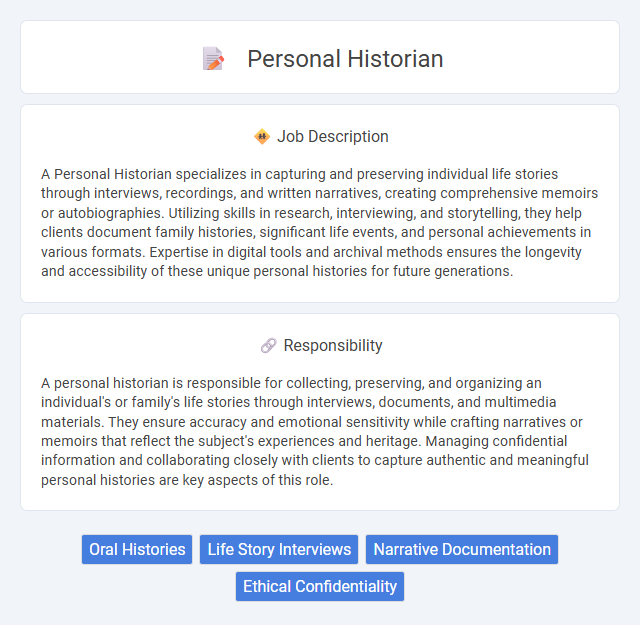
A Personal Historian specializes in capturing and preserving individual life stories through interviews, recordings, and written narratives, creating comprehensive memoirs or autobiographies. Utilizing skills in research, interviewing, and storytelling, they help clients document family histories, significant life events, and personal achievements in various formats. Expertise in digital tools and archival methods ensures the longevity and accessibility of these unique personal histories for future generations.
Individuals who are empathetic, detail-oriented, and patient are likely to be well-suited for a personal historian role. Those who enjoy listening to others' life stories and have a strong interest in preserving personal memories may find this job fulfilling. Conversely, people who struggle with active listening or lack an appreciation for storytelling might find this role challenging.
Qualification
Personal historians typically require a background in history, journalism, or communications, often complemented by strong storytelling and interviewing skills. Proficiency in digital recording tools, transcription software, and content editing enhances the ability to capture and present clients' life stories effectively. Certification from professional organizations like the Association of Personal Historians can further validate expertise and credibility in this specialized field.
Responsibility
A personal historian is responsible for collecting, preserving, and organizing an individual's or family's life stories through interviews, documents, and multimedia materials. They ensure accuracy and emotional sensitivity while crafting narratives or memoirs that reflect the subject's experiences and heritage. Managing confidential information and collaborating closely with clients to capture authentic and meaningful personal histories are key aspects of this role.
Benefit
A personal historian job likely offers the benefit of preserving valuable memories and family histories, which can provide clients with a tangible connection to their past. This role may also enhance clients' emotional well-being by helping them document and celebrate their life stories. There is a strong probability that personal historians build meaningful relationships through their empathetic listening and storytelling skills.
Challenge
The role of a personal historian likely involves navigating sensitive family stories and managing privacy concerns, which can be challenging. There is a probability that clients might struggle to recall specific details, requiring patience and skillful interviewing techniques. Complex emotional dynamics often present obstacles, necessitating empathy and discretion throughout the documentation process.
Career Advancement
Personal historians build careers by developing expertise in oral history techniques, archival research, and digital storytelling, enhancing their credibility and marketability. Gaining certifications from professional organizations such as the Association of Personal Historians or Joining networks like the National Association of Memoir Writers can open doors to high-profile clients and speaking engagements. Specializing in niche markets like family legacy projects or corporate storytelling accelerates career growth and increases income potential.
Key Terms
Oral Histories
Personal historians specializing in oral histories collect, preserve, and interpret firsthand accounts of individuals' life experiences, ensuring their stories are accurately documented for future generations. They use recording equipment and transcription services to capture detailed narratives that reveal cultural, historical, and emotional insights. Expertise in interviewing techniques and active listening skills is essential to authenticate memories and create meaningful historical archives.
Life Story Interviews
Life story interviews form the core of a personal historian's role, collecting detailed narratives that preserve an individual's unique experiences and memories. These interviews require skilled listening, empathy, and comprehensive questioning techniques to capture authentic and meaningful life events. The resulting narratives are often transformed into memoirs, audio recordings, or documentaries, providing lasting legacies for families and communities.
Narrative Documentation
Personal historians specialize in narrative documentation by capturing and preserving individual life stories through detailed interviews, transcription, and storytelling techniques. They create compelling, accurate accounts that reflect clients' personal histories and memories, often producing written memoirs, audio recordings, or multimedia presentations. Expertise in research methods and sensitivity to personal contexts ensures authentic and meaningful documentation of a person's experiences.
Ethical Confidentiality
Personal historians handle sensitive and intimate life stories, demanding strict adherence to ethical confidentiality standards to protect client privacy. They implement secure data storage, obtain explicit consent before sharing any personal information, and maintain discretion throughout the storytelling process. Ensuring trust and respect is paramount for fostering open communication and preserving the integrity of each individual's narrative.
 kuljobs.com
kuljobs.com